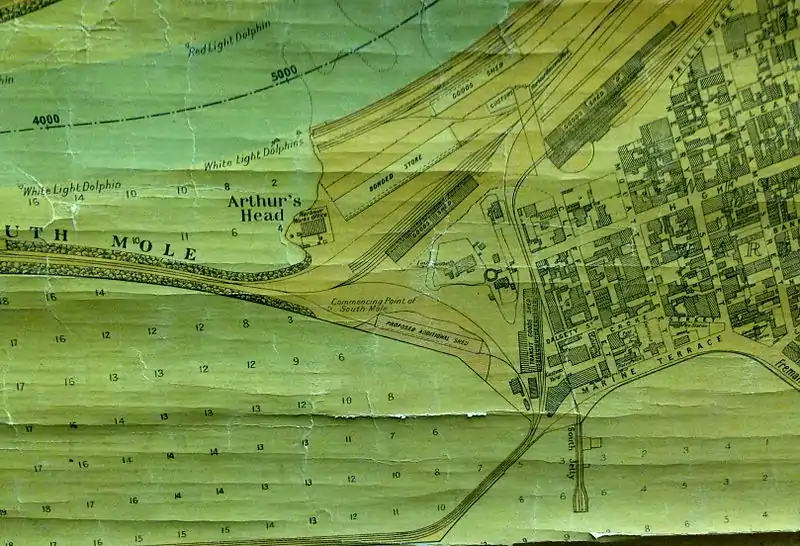Arthur Head
Arthur Head (also known as Arthur's Head) in Fremantle, Western Australia, is a former large limestone headland on the southern side of the mouth of the Swan River, now also the entry to Fremantle Harbour.
| Arthur Head | |
|---|---|
 Arthur Head Reserve from near the Old Kerosene Store on Bathers Beach | |

| |
| General information | |
| Type | Headland |
| Location | Fremantle, Western Australia |
| Coordinates | 32.056847°S 115.741461°E |
| Official name | Round House and Arthur Head Reserve |
| Type | State Registered Place |
| Designated | 19 November 1993 |
| Reference no. | 896 |

Historian Bob Reece identifies the geographical prominence of the location in his entry in the Historical Encyclopedia of Western Australia:[1]
Fremantle is a narrow peninsula of land located at the estuary of the Swan River within Cockburn Sound, its principal landmarks from the sea being the limestone outcrop known as Arthur Head and the two hills known as Buckland Hill and Monument Hill
Also the strategic quality of the head is noted as:
In May 1829 the strategic location of Arthur Head led it being chosen by Captain Charles Fremantle RN as the site for his fortified beach camp.[2]:4
It has been significantly altered since European settlement in the 1830s, and is the site of a large number of demolished structures.[3]
Archaeologist Michael Pearson in his 1984 report identified the following:
- 1851 Lighthouse (first)
- 1876 Lighthouse (second): 22 feet (6.7 m) in diameter, 72 feet (22 m) high; constructed by convicts in 1876–1879; decommissioned in 1902.[4]
- 1834 Courthouse (first)
- 1840 Courthouse (second)
- 1852 Police station complex
- Lighthouse keeper quarters
- Harbourmaster quarters
The structures remaining on the head are the Round House, the oldest remaining building in Western Australia, and the pilots' cottages, all of which are heritage listed. Passing through Arthur Head is the Whalers Tunnel that enabled ease of access to Bathers Beach, Fremantle and the Long Jetty.
A significant part of the Arthur Head area was utilised during World War II; the slipway constructed then for submarine repairs[5] was known as the Arthurs Head Slipway.[6]

Notes
- Gregory, Jenny; Gothard, Janice (2009). Historical encyclopedia of Western Australia. University of Western Australia Press. p. 387. ISBN 978-1-921401-15-2.
- "Fremantle: The Port's History". Daily News (Perth). 1 October 1921. p. 4. Retrieved 26 July 2020 – via Trove.
- Hutchison, D. E. (David Eric); Fremantle Arts Centre Press (2006), Fremantle walks, Fremantle Arts Centre Press, p. 84, ISBN 978-1-921064-30-2 Hutchison summarises the work of Pearson (Pearson, Michael; Fremantle (W.A.). Council (1984), Report of an investigation into the historical archaeological resource within the Arthur Head area, Fremantle, Centre for Prehistory, University of Western Australia, retrieved 17 May 2013) with comment that Pearson counted 72 structures, most demolished, in the vicinity of Arthur Head.
- "Arthur Head". Lighthouses of Western Australia. Retrieved 2 June 2014.
- "HARBOUR SLIPWAY". The West Australian. Perth: National Library of Australia. 3 November 1945. p. 10. Retrieved 9 May 2014.
- Plans of the telescopic cradle at the Arthur's Head Slipway, Fremantle Harbour, W.A, State Records Authority of New South Wales, 31 December 1940, retrieved 27 September 2013